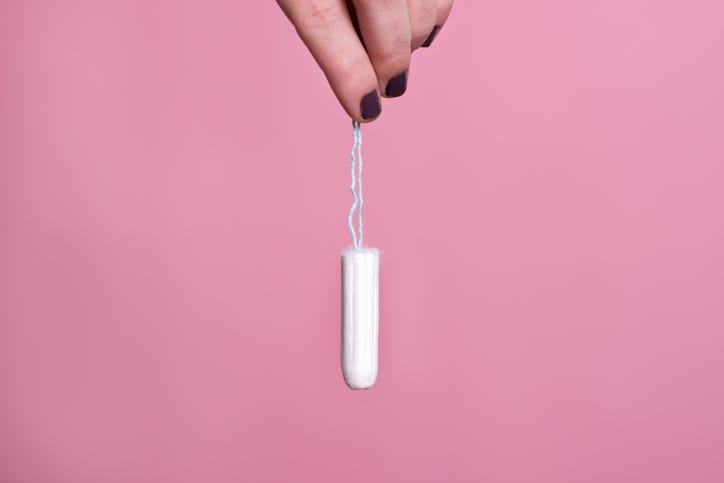
Tampax is being sued over claims that its feminine hygiene products contain dangerous chemicals.
A proposed class-action lawsuit filed against parent company Procter & Gamble says Tampax Pure Cotton tampons are advertised as having a "100% organic cotton core" when in actuality, the products allegedly contain toxic per- and polyfluoroalkyl substances (PFAS) commonly known as "forever chemicals."
The 42-page suit filed in a U.S. District Court accuses P&G of capitalizing on consumer demand for eco-friendly products that limit unnecessary chemical exposure and marketing Pure Cotton tampons as a "safe, natural choice for feminine hygiene" with "simple ingredients" that "users can feel good about" and "trust." Even further, the products are advertised to contain "only the ingredients you need," according to the lawsuit.
"Defendant intentionally and knowingly leads consumers to believe that the tampon products are a healthy product for absorbing menstrual fluid, and that they do not contain any chemicals that are potentially harmful to women's health," the complaint states.
The product packaging additionally includes representations that the Pure Cotton tampons are made with "100% organic cotton" and are "the best of science and nature," which the lawsuit says were intentionally designed "in order to lead reasonable consumers to believe that the tampon products do not contain any potentially harmful chemicals."
However, independent testing shows that the products contain PFAS, synthetic chemicals linked to numerous health concerns and known to accumulate in the body and environment, according to the lawsuit. The presence of PFAS, which can be absorbed through the skin, are especially concerning in menstrual products because the "vaginal ecosystem" is more sensitive and absorbs chemicals at a higher rate than other areas of the body, the complaint notes.
Negative health effects associated with PFAS include "decreased male and female fertility, negative developmental effects or delays in children, increased risk of cancers, liver damage, and thyroid disease, adverse impacts on the immune system, interference with hormones and increased cholesterol levels," the lawsuit states.
The lawsuit further explains that "there is no treatment to remove PFAS from the body" and as such, the substances are often referred to as "forever chemicals."
According to the complaint, the product packaging lists ingredients -- cotton, polypropylene, polyester, glycerin, paraffin and titanium dioxide -- but makes no disclosure about the potential presence of PFAS.
The lawsuit accuses P&G of targeting health-conscious consumers by falsely, misleadingly and deceptively representing its tampon products as pure and organic in order to make a profit.
"Defendant knew and intended consumers would pay a premium for the products over comparable products that are made from or contain synthetic or artificial chemical ingredients," the lawsuit states. "No reasonable consumer would consider Defendant's products 'pure,' or good for people and the environment, if she knew that the products contained harmful, artificial PFAS chemicals."
Three California women who filed the lawsuit said they never would have purchased the products, especially at a premium price, "had they known the truth about the products' artificial, man-made, and harmful ingredients."
The complaint accuses P&G of violating consumer protection law, false advertising, and unjust enrichment by intentionally misrepresenting the qualities and characteristics of the products while concealing the existence of PFAS chemicals and failing to inform consumers of the existence of PFAS in its products. It is seeking compensatory damages for anyone, nationwide, who purchased the products.
P&G has not commented on the lawsuit.


